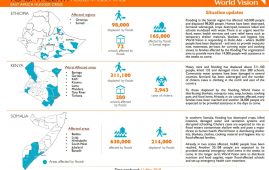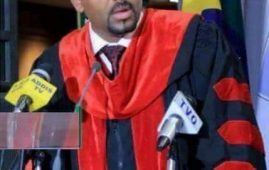(By Mehari Taddele Maru (PhD)
* The elections of the leadership of the African Union has surged the democratic profile of the AU, especially after an eventful 2011 that brought North Africa uprisings and more than 21 elections.
Recently, in July 2012, the high-profile and bitterly fought nine month race for the Chairmanship of the AU Commission between the incumbent Dr Jean Ping of Gabon, and his main challenger, South Africa’s Home Minister, Dr Nkosazana Dlamini-Zuma, culminated in the victory of the latter. This victory came after a deadlock at the 18th AU Summit in January 2012. An ad hoc Committee of Eight composed of eight Heads of state and government, including the Prime Minister of Ethiopia, Meles Zenawi and the President of South Africa Jacob Zuma, was established to formulate solutions to this electoral deadlock. This committee failed to come up with a decisive solution. Thus, Dr Dlamini-Zuma’s victory came after nine months of micro-targeted and aggressive election campaign as well as vote trading. South Africa allocated significant amount of finance for horse-trading and carried out thorough ‘envelop diplomacy’. The election of Dr Dlamini-Zuma represented a political resolution and less of a legally sanctioned decision. The summit was keen to get out of the deadlock, avoid election fatigue and voted expediently.
challenger, South Africa’s Home Minister, Dr Nkosazana Dlamini-Zuma, culminated in the victory of the latter. This victory came after a deadlock at the 18th AU Summit in January 2012. An ad hoc Committee of Eight composed of eight Heads of state and government, including the Prime Minister of Ethiopia, Meles Zenawi and the President of South Africa Jacob Zuma, was established to formulate solutions to this electoral deadlock. This committee failed to come up with a decisive solution. Thus, Dr Dlamini-Zuma’s victory came after nine months of micro-targeted and aggressive election campaign as well as vote trading. South Africa allocated significant amount of finance for horse-trading and carried out thorough ‘envelop diplomacy’. The election of Dr Dlamini-Zuma represented a political resolution and less of a legally sanctioned decision. The summit was keen to get out of the deadlock, avoid election fatigue and voted expediently.
An ex-wife of the current President of South Africa Mr Jacob Zuma, and the only remaining member of the cabinet of former President of South Africa Thabo Mbeki, it was widely believed that Dr Nkosazana Dlamini-Zuma may challenge her ex-husband in the bid to the presidency. An extension of South Africa’s domestic political struggle and internal arrangement, her candidature to the AU Commission chairpersonship represents a compromise deal to remove her from the local political landscape. A closer look at the voting behaviour of many African countries reveals that colonially-inherited language grouping as Francophone vs. Anglophone, an aggressive micro-targeted election campaign; financial horse-trading and vote-trading influenced the votes. Moreover, national interests and solidarity on regional basis determined the voting preferences of the countries.
Immediate Challenges
With this background in mind, when Dr Dlamini-Zuma takes her chair in October 2012, she will face challenges on many fronts, not least due to her diminished legitimacy and embattled personality as a consequence of the election campaign. Furthermore, many key regional powers such as Nigeria, Ethiopia, Egypt, Kenya and Algeria may have concerns on how she would work with them on issues surrounding their interest and regional sphere of influence. Thus, the most immediate task is to gain the trust and confidence of these countries that voted and lobbied against her. Even while attending urgent matters, Dr Dlamini-Zuma needs to focus on the most important actions with long-term implications. By focussing on delivering her promises, she can continue to enjoy the confidence of member states that voted for her and, at the same time, win the trust of all those who voted against her.
The most urgent matters that require her immediate attention include, state building in Somalia and South Sudan; addressing the governance problems in Sudan, border disputes between countries (Eritrea with its neighbouring countries, Sudan and South Sudan), military operation against the Lord’s Resistance Army (LRA), localised civil war in the Great Lakes region; new and emerging terrorist threats in the Sahel region including Boko Haram violence in Nigeria, maritime insecurity in the Gulf of Aden and Gulf of Guinea and constitutional crisis in Mali, Guinea Bissau and Madagascar. Since these problems of peace and security are mainly consequences of bad governance, extreme poverty and violent extremism, Dr Dlamini Zuma needs to focus on addressing the root causes of these problems by ensuring human security. Needless to say, ensuring human security in Africa is an enormous task, and can be attained only gradually. However, the steps towards this should begin immediately.
The AU’s success in responding to Africa’s human security challenges depends on the successful discharge of its mandates and efficacy in the implementation of its decisions. More critically, the quality of leadership and management of the AU Commission, and its technical, human resource as well as financial capacity will play a vital role in the efficiency, effectiveness and relevance of the AU to the African people. Thus, Dr Dlamini-Zuma needs to focus on transforming the AU into an effective institution for achieving human security in Africa.
AU Commission – Powering the Union Ahead
The AU Commission is a vital organ of the AU which serves as a secretariat responsible for conducting its day-to-day affairs. This includes implementing AU policies and decisions of the policy making-bodies, including the AU Assembly. More importantly, it plays the role of initiating and facilitating the development of common policies and norms, coordinating the policies of member countries and promoting integration, democracy and peace and security. It prepares the strategic plans of the Union, provides administrative, secretarial as well as substantive expertise support for the various bodies including the Peace and Security Council of the AU and coordinates their activities and meetings. The AU Commission is also responsible for representing and defending the interests of the Union. In short, while member states are the body parts of the AU, the Commission is the engine on which the Union depends not only for its effective functioning, but also for its ability to achieve its objectives as set out in the Constitutive Act of the AU. No matter how smart or energetic a chairperson is neither the urgent nor the important matters listed above can be addressed efficaciously without an efficient AU Commission.
Despite its vital role, the AU Commission’s budget performance and human resource capacity remains shockingly dismal. In 2011, the AU approved $263,814,748. However, the actual expenditure of the AU stands at 63 percent of the total approved budget. This indicates the low absorption capacity of the AU, and conceals even deeper problems. The AU Commission, in particular, takes 78 percent of the budget. Still, its absorption capacity remains depressingly low at 50 percent. Of the AU programmes funds available ($77.3 million); the execution rate remains very low at 39 percent, while 92 percent of the operational budget is utilised as salary, travel and allowances expenses. Some departments such as the Department of Social Affairs are “struggling between execution rates of 15percent and 25 percent.”
In the same manner, critical human resource capacity limitation characterises the AU. The AU Commission currently has 691 staff members, which is 48 percent less than the full complement approved almost six years ago. The turnover of staff members, particularly new recruits, at the level of professional and division heads is 40 percent. For almost eight years, the Department of Social Affairs functioned with less than 30 percent of its full staff complement that was approved in 2003, relaying on sho
rt-term consultants.
Lack of Accountability and Good Governance – The Urgent Need for Reforms
Due to lack of progressive follow-up and total absence of sanctions on leadership, departments with the lowest rate of execution almost always request for an allocation of more funds each year. This reveals the lack of accountability mainly at the leadership level of the AU Commission. Generally speaking, the poor performance of the AU originates directly from the bad governance within the AU. Thus, Dr Dlamini-Zuma’s legitimacy will be determined by her performance in terms of reforming the AU Commission. This requires bright vision committed to leaving a solid legacy of leadership, courage to sacrifice the comfort zone of perusing one’s country foreign policy, persuading member states when possible and challenging them when necessary.
Another area of important reform relates to the implementation of norms set by the AU. All global and regional governance institutions like the AU have four functions: norm-setting, norm-diffusion, norm-implementation and supervision. In the past one decade, the AU focused on policy formulation. Consequently, the AU has more than 200 well-advanced legislative and policy frameworks on several issues, including democratic constitutional governance. It has 43 treaties and conventions of which nine are yet to enter into force. On an average, a treaty formulation (from drafting to its adoption at the AU Summit where more than 7000 participants attend) costs $1,000,000. If this amount were utilised for the implementation of existing treaties at national and regional levels, it would have significantly enhanced the impact of the AU on the lives of many Africans.
In this regard, the most binding constraint in the AU system is the gap between norms set in treaties and institutions on one hand, and their implementation on the other. It is for this reason that implementation and operationalisation of the existing legal and institutional frameworks should take priority in the next decade. If Dr Dlamini-Zuma wants an AU that is relevant to the ordinary Africans, she needs to make her term of office as a ‘term of implementation”, not another term of norm-setting.
Demand from Development Partners
For development partners like India, the primary demand from the AU is efficiency in the utilisation of resources they donate and an effective business partner. For India, its partnership with the AU should be taken to higher level than the existing one which is limited to education, information and technology connectivity. Comparative advantage and high return for investment of India in Africa may serve as factors to determine the areas of cooperation. Given that India shares many similar historical, cultural and economic conditions and challenges with Africa, it can be a genuine partner for development. Its comparative success in the development of information technology, outsourcing industry, and education for public services could be areas for a more robust partnership. Its relative achievement in managing diversity while maintaining a large democracy in the developing world offers inspirational lessons for Africa. Currently, global cooperation arrangements such as the AU-EU have focused on peace and security and human rights. Thus, deliberate focus on the other programmes would enhance the return to the support India extends to Africa. Capacity building programmes in science, technology, and in the development of policy for diversity management creates an excellent niche for India-Africa partnership. In this regard, particular emphasis must be given to the education of young African leaders and professionals in order to address the developmental challenges of Africa.
Another area of partnership and an opportunity for mutual support is global diplomacy, including the reform of the UN and the UNSC. India, through BRICS, could support AU’s effort at the international level. For India too, such support would garner a diplomatic backing from most of the 54 countries.
**************
* Originally published on the Diplomatists – on Aug. 2012, titled “Change of Guard: African Union Elects First Woman Leader”, authored by Mehari Tadelle Maru.
* Dr Mehari Taddele Maru is Programme Manager for African Conflict Prevention and Risk Analysis at Institute for Security Studies (ISS), Addis Ababa Office. A former fellow of very prestigious programmes at Harvard University, he holds Doctorate of Legal Sciences (DSL) from JL Giessen University, Germany, MPA from Harvard University and MSc from the University of Oxford and LLB from Addis Ababa University. Prior to joining the ISS, he was Programme Coordinator for Migration at African Union Commission. Dr Mehari served as Legal Expert at the African Union Commission and as Director of the Addis Ababa University Office for University Reform.
***************
Check the dropdown menu at the top for related posts.




